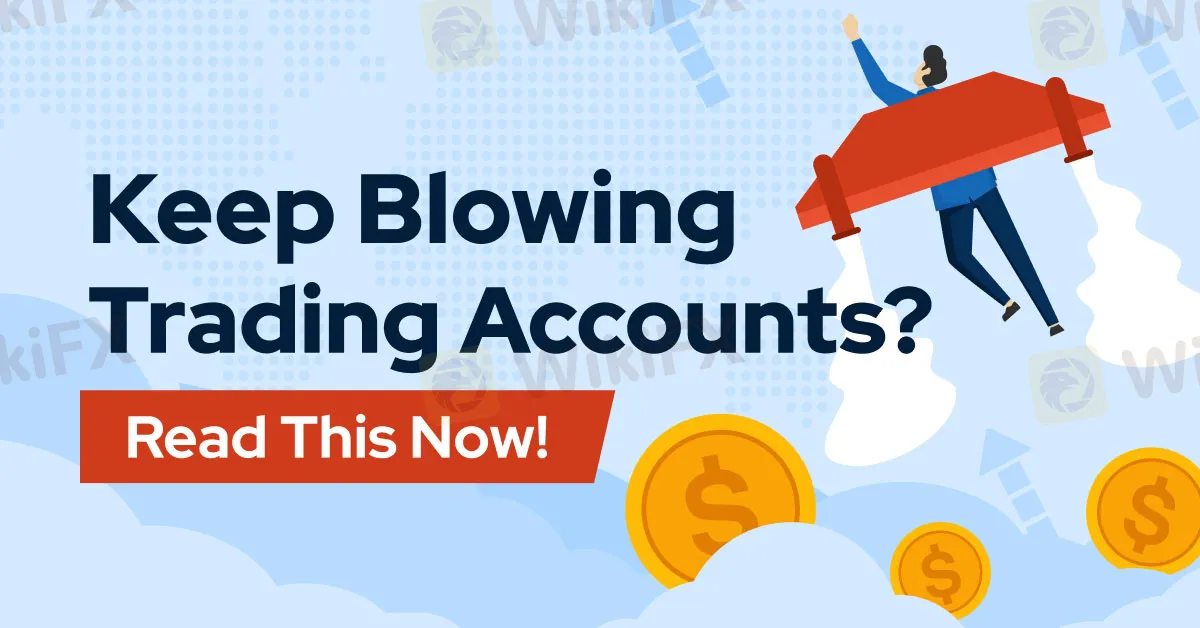简体中文
繁體中文
English
Pусский
日本語
ภาษาไทย
Tiếng Việt
Bahasa Indonesia
Español
हिन्दी
Filippiiniläinen
Français
Deutsch
Português
Türkçe
한국어
العربية
Keep Blowing Trading Accounts? Read This Now!
Abstract:In the tumultuous world of forex and crypto trading, where the allure of quick profits often leads to repeated blows to trading accounts, aspiring traders must heed the crucial lesson of prioritizing risk management over the search for shortcuts to success.

In the fast-paced world of forex and crypto trading, the allure of quick profits can often overshadow the importance of a fundamental principle: risk management. For aspiring traders, the journey to success is often fraught with challenges, setbacks, and the all-too-familiar experience of blowing trading accounts. However, amidst the chaos and volatility of the markets, there lies a crucial lesson that every trader must heed: prioritize risk management above all else.
It's a scenario all too familiar to many aspiring traders. You enter the market with high hopes and lofty expectations, fuelled by the promise of quick riches and financial independence. Armed with a plethora of trading strategies and technical indicators, you dive headfirst into the world of trading, only to find yourself on the losing end of trade after trade.
But here's the truth: success in trading isn't about finding the perfect strategy or uncovering the next big trend. It's about managing risk effectively and preserving your capital in the face of uncertainty. As renowned trader and author Nassim Nicholas Taleb famously said, “It's not how much money you make, but how much you don't lose.”

So, what does effective risk management entail? At its core, it's about understanding and accepting the inherent risks of trading while implementing strategies to mitigate those risks. This includes setting appropriate stop-loss levels, diversifying your trades across different assets, and avoiding over-leveraging your positions.
One common mistake that many novice traders make is neglecting to set stop-loss orders or moving them further away in the hope of avoiding a loss. However, this approach often leads to catastrophic losses when trades move against you unexpectedly. By setting predetermined stop-loss levels and sticking to them religiously, you can limit your losses and protect your capital from excessive drawdowns.
Additionally, diversification is key to managing risk in trading. Instead of putting all your eggs in one basket, spread your trades across different assets, markets, and timeframes. This not only helps to reduce the impact of any single trade on your overall portfolio but also ensures that you're not overly exposed to any one particular market or asset class.
Furthermore, it's essential to avoid over-leveraging your positions, as this can magnify both your gains and losses. While high leverage may amplify your profits during winning trades, it also significantly increases the risk of wiping out your account during losing streaks. As a general rule of thumb, aim to keep your leverage levels conservative and never risk more than you can afford to lose.
In conclusion, for aspiring traders who find themselves repeatedly blowing trading accounts, the solution lies not in seeking out the next hot tip or trading strategy, but in mastering the art of risk management. By prioritizing capital preservation and implementing sound risk management practices, you can tilt the odds of success in your favour and navigate the treacherous waters of the markets with confidence. Remember, in trading, it's not about how much you make, but how much you don't lose.

Disclaimer:
The views in this article only represent the author's personal views, and do not constitute investment advice on this platform. This platform does not guarantee the accuracy, completeness and timeliness of the information in the article, and will not be liable for any loss caused by the use of or reliance on the information in the article.
Read more

Italian Regulator Warns Against 5 Websites
The Italian regulator, CONSOB has issued a warning against five websites offering unauthorized financial services. This regulatory action aims to protect the public from fraudulent activities.

Trader Exposes Unethical Practices by STP Trading
A recent allegation against STP Trading has cast doubt on the firm's business practices, highlighting the potential risks faced by retail traders in an increasingly crowded and competitive market.

What Makes Cross-Border Payments Easier Than Ever?
Cross-border payments are now faster, cheaper, and simpler! Explore fintech, blockchain, and smart solutions to overcome costs, delays, and global payment hurdles.

Coinbase Under Scrutiny Amid Wrapped Bitcoin Delisting Controversy
Coinbase has come under fire after announcing its decision to delist Wrapped Bitcoin (wBTC), a move critics claim could be driven by competitive interests. The delisting, set to take effect on 19 December, has sparked allegations of market manipulation and concerns about fairness in the cryptocurrency ecosystem.
WikiFX Broker
Latest News
Hackers Charged for $11M Crypto Theft Using SIM-Swaps
Role of Central Banks in the FX Market
FCA Alerts Against Sydney FX
What Makes Cross-Border Payments Easier Than Ever?
Trader Exposes Unethical Practices by STP Trading
Bitcoin Nears $100,000: A Triumph of Optimism or a Warning Sign?
Malaysian Man Loses RM113,000 in Foreign Currency Investment Scam
Mastercard Partners with JPMorgan for B2B Cross-Border Payments
FCA Identifies Clone Firm Exploiting Admiral Markets' Credibility
Coinbase Under Scrutiny Amid Wrapped Bitcoin Delisting Controversy
Currency Calculator


